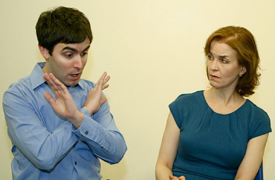A parent gets sick or dies; damaged or estranged family members gather. This is the ur-text of present-day American theater. We can't avoid this fundamental plot machine. But we can appreciate what different playwrights do with it.
Dark drama, comedy, absurdity – all are valid approaches. But the talented playwright Nicky Silver tries all three in Raised in Captivity, and perhaps inevitably, though he nails various targets over the course of the longish two-acter, he ultimately gets spun around one too many times and pins the tail on the Led Zeppelin poster.
The play received a Drama Desk Award nomination for Outstanding Play in 1995, and for a good part of the first act I could understand why: it boasts several very funny scenes, then takes an effective if somewhat confusing turn towards darkness as it draws to a close. Emilie Elizabeth Miller is very droll as Bernadette, the motor-mouthed, weight-obsessed sister. Trailing her sad-sack husband Kip (Bryant Mason), a dissatisfied dentist, she reaches out to her prodigal twin brother Sebastian, but he wants no part of her neuroses, or her hospitality.
Josh Lefkowitz, an actor with sparkling comic timing and the not unrelated ability to draw us in to his state of mind with every phrase of spoken or body language, is the best reason to see this production.  His Sebastian is an exquisite sad clown, but he's far from a flat character; the changes he undergoes ring affectingly true right through the end of the play.
His Sebastian is an exquisite sad clown, but he's far from a flat character; the changes he undergoes ring affectingly true right through the end of the play.
José Joaquín Pérez is also excellent in two roles: a convicted murderer whose prison correspondence has become Sebastian's only link to the world outside his own miseries, and a male prostitute who takes a liking to Sebastian. Mr. Pérez is a startling, dangerous sort of presence, like a young, more athletic Dustin Hoffman. His hard-edged, damaged characters pull the play towards a level of sinewy, sweaty reality.
Yet this strand is pulled loose by (among other things) Sebastian's shrink, a character who seems to belong in a different play, a shock-romp of some kind. As the fulcrum of the play's absurdist arm, Jennifer Dorr White does all she can with the strange role, but it's so out there that there's ultimately no there there. An excellent actress, she's more convincing and centered in her secondary role, that of the twins' deceased mother, who pays a post-funerary visit to Sebastian with an honestly shocking revelation.
Mr. Mason plays Kip very broadly, doing, similarly, all he can with a role that quickly becomes a one-note song. Both he and Ms. Dorr find themselves yelling a lot, induced by the script to develop their characters by force of will, rather than by organic growth as with Sebastian. Kip is a quintessential type, a character who abandons his unhappy rut and follows his dream, and we go happily with him for a while. But as he proves quite blind to any subtleties or consequences, the light of humor goes out and he loses us. His deliciously addled wife, meanwhile, gets inexplicably calm and rational in Act Two. That's frustrating because one really wants to feel for the sister as deeply as one does for the brother, but the arcs of the characters don't allow it.
With a beginning that makes us laugh a lot, and an ending that's touching and effective, Raised in Captivity does hold the attention. But ultimately it leaves one wondering what exactly one has been attending. There's a good story in here, and the play is ably staged and well acted. But its crafting is too unsettled. Like a cruise in rough water, it doesn't bore, but it leaves one queasily dissatisfied.
Raised in Captivity runs through Feb. 15 at the the Shell Theater, 300 W. 43 St., NYC. Staged by the Red Fern Theatre Company.
Photo of Josh Lefkowitz and Jennifer Dorr White by Nathan Johnson.


